The approach to the parish church is one of the loveliest in the county, a row of Tudor houses which form the core of the village, but the old church itself has given the good people of Framfield more than their fair share of headaches over the centuries.
Built in the 13th century, one of the first in Britain to be dedicated to St Thomas a Becket, much of it was destroyed in a disastrous fire in 1509 and the parishioners petitioned Henry VIII to grant his approval for churches in four counties to give financial help towards its repair. Then in 1667 a second calamity occurred: the tower of the church collapsed one Sunday just after the faithful had departed from morning service. The villagers seem to have shrugged off what was almost a major tragedy and made do without a tower for a couple of centuries, when the bells (one of which bears the delightful inscription ‘Oblige me not to call in vain’) were rehung in the new structure. A rather obstinate churchwarden in Victorian days built himself a chimney and grate in his pew, no doubt for a little creature comfort during the sermons. It apparently took a lot of persuasion from the congregation to get him to remove it.
It was thanks to the reforming zeal of the Reverend Henry Hoare in the 1840s, records Herbert Keef in his description of the church, that the building ‘was saved from utter ruin arising from the scandalous neglect of the responsible Church authorities.’
Framfield was the birthplace, in 1834, of Robert Realf, a poet from the age of 15 and a leading campaigner in the fight against slavery. After emigrating to America he did missionary work in the slums of New York. He met the great abolitionist John Brown who proposed to make him Secretary of State in his government. Following Brown’s capture at Harper’s Ferry. Realf was arrested but later released and he joined the Union Army in the Civil War, writing war songs to cheer the spirits of the Yankee soldiers, and when he left the Army he established a school for freed slaves. He killed himself at Oakland, California, in 1878. A sad end for a man who achieved so much for people so far away from his own roots.
Long gone are the days when local benefactor Lady Thornton played her part in keeping the poorer members of the community both warm and smart. Every year she presented a dozen cloaks, for six village boys and six village girls. They were all made by the lady’s maid.
Framfield’s older inhabitants might think twice about repeating the courageous action of their forebears. In 1792 it is recorded that a cricket team composed entirely of the village’s septuagenarians challenged any village in Sussex to a game. Unfortunately no details exist of any such match taking place; maybe nobody dared risk the ignominy of a thrashing from the old ‘uns.
